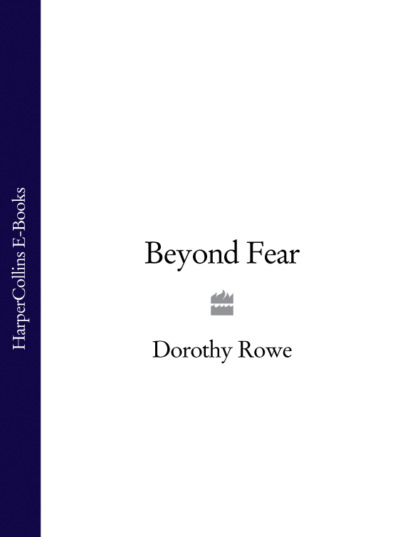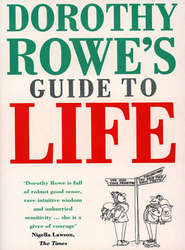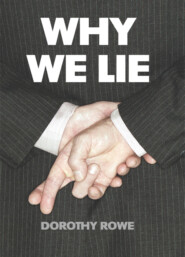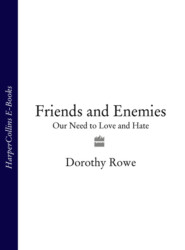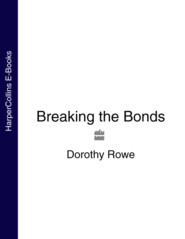По всем вопросам обращайтесь на: info@litportal.ru
(©) 2003-2024.
✖
Beyond Fear
Автор
Год написания книги
2018
Настройки чтения
Размер шрифта
Высота строк
Поля
When we feel responsible for certain matters but fail to prevent disaster we feel guilty. Guilt is the fear of punishment, and, uncomfortable though it may be, many people prefer to feel guilty than to feel helpless. Guilt implies that you could have kept these matters under control but you failed to act. Helplessness is a recognition of how little in the world we do in fact control and how chance-filled life can be, and this understanding can be very frightening because through it we know that we can be struck by disaster at any time and that our ideas about what is happening can be proved wrong.
Thus, when disaster strikes and we ask, ‘Why in the whole scheme of things has this happened?’ we seek an answer which will show a clear pattern of cause and effect. Such an answer will remove uncertainty and keep our meaning structure whole. As a result the answer ‘It was my fault’ can be preferable to the answer ‘It happened by chance’.
Many of us begin our struggle with such questions when we are young. In a television series a mother, Nicky Harris, described the guilt she felt when her second child, a baby boy called Jordan, suddenly died. She discovered that her four-year-old daughter Jessica was also struggling with questions of guilt and responsibility. Nicky said:
I realized soon after he died that she was feeling the same guilt that I was feeling. We always talked, and about a month after he died she said to me, ‘Mummy, I know why Jordan died,’ and I said, ‘Why?’ and she said, ‘I bounced the bouncy chair too hard. Do you remember when you told me not to do that?’ And I felt the guilt flowing out and I was able to deal with it. I just totally knocked that theory on the head. It had nothing to do with it. I thought I’d got that over with, and then a couple of weeks later she came back to me and she said, ‘Mummy, I think I’ve definitely worked it out now.’ This is a four-year-old child talking to me. She said, ‘When Grandma was sitting over there and you were sitting over here, and I was hugging Jordan, and Grandma said, ‘Don’t hug him too tight, you’ll kill him.’ She said, ‘That was it. I must have hugged him too tightly.’ Inside I was crying for her for I felt the same way.
(#litres_trial_promo)
Here was a four-year-old prepared to take responsibility for her brother’s death because she saw that as being preferable to knowing that terrible things can happen at any time and that neither she nor her mother could prevent them. Yet, even though pride may have provided her with an explanation which showed that this event did not happen by chance, this explanation would ensure that she could never be happy. Happiness, she would have come to believe, was something she did not deserve.
I continued to study the functions of pride, and by the time I came to write Friends and Enemies
(#litres_trial_promo) I was thinking in terms of two kinds of pride - moral pride, which is a way of thinking which develops as we create a conscience, and primitive pride, which is an integral part of the functioning of the meaning structure. Both kinds of pride aim to maintain the integrity of the meaning structure and thus prevent us from changing, and both can work together and enhance each other, but, while moral pride can be a spur to unselfishness, tolerance and a love of truth, and be amenable to logic and reason, primitive pride is always utterly selfish, utterly ruthless and impervious to the demands of reason. Nicky Harris described how, while she knew quite well that she was not responsible for her son’s death, she could not help expecting and indeed wanting the police to arrest and punish her.
(#litres_trial_promo)
Any working system has within it certain forms or mechanisms which enable the system to function. I wrote:
The meaning structure is a self-regulating system. All self-regulating systems have within their structure some mechanism which maintains the integrity of the system, preventing it from grinding to a halt or shattering to pieces. Our body, a self-regulating system, has a number of such mechanisms. The mechanism which forms blood clots to stem the flow of blood through a wound is one. In the meaning structure primitive pride is the form of thought or mechanism which selects from within the individual meaning structure a collection of meanings; when put together, these meanings serve to give immediate protection to the integrity of the meaning structure. This collection of meanings may have little relationship to what is actually happening or in the long term be an adequate defence. Indeed, it usually creates more problems than it was assembled to solve. Its importance is that it can be assembled immediately, in the blink of an eye.
(#litres_trial_promo)
In psychology no one ever discovers anything which is completely new. Many people have noticed pride’s function in survival as a person, though they may not have called it pride. Psychoanalysts have described the defence of rationalization, and one analyst, Karen Horney, wrote about what she called ‘pride systems’. More recently two American psychologists, Daniel Gilbert and Timothy Wilson, uncovered what they called a ‘psychological immune system’, which was ‘an army of rationalizations, justifications and self-serving logic’.
(#litres_trial_promo) Many psychologists working with people who are experiencing a psychosis now see hallucinations and delusions as methods of trying to maintain ‘self-esteem’.
(#litres_trial_promo)
‘Self-esteem’ is a jargon term for a complex of ideas concerning how we feel about ourselves - that is, how much we care for and care about ourselves, how much we value ourselves, on what values we judge ourselves and how harshly we judge ourselves. When we are fond of ourselves, look after ourselves, when we value ourselves and judge ourselves reasonably and in a kindly manner, we feel self-confident, and so when we encounter a crisis or disaster we see it as a challenge which we shall master. When we do make a mistake both moral and primitive pride can comfort us. If, for example, you make some arithmetical errors in your income tax return and someone points this out to you, you can comfort yourself by thinking, ‘Well, I mightn’t be good at maths but I really know how to put words together.’ Or, when someone is unpleasant to you, instead of trying to work out why, you can simply assume that actually, underneath, that person really does like you.
The more we despise and hate ourselves the greater the degree of comfort pride has to create, and the greater the degree of comfort we need the less realistic that comfort becomes. Thus we can take pride in having impossibly high standards, or we can take pride in being the object of a worldwide conspiracy of influential people, or in possessing some vast mystical power which controls the universe. Our pride can indeed comfort us, but we can become so attached to that comfort that we refuse to give up our comforting delusions, even though these are the very ideas that create great distress for us because they are so removed from a realistic appraisal of ourselves and our world. We hang on to our comforting delusions, not just because they comfort us, but because they protect us from our greatest fear.
Our Greatest Fear (#ulink_c33b110d-4522-556f-b305-2cc8ec2920e1)
We experience our existence in such a way that it seems to us that we live in two separate realities. One is the reality of what goes on outside us, what we call the world. The other is what goes on inside us, our thoughts, feelings, images, sensations and perceptions. To cope with living we have to be able to distinguish what goes on inside us from what goes on outside us, and then to knit together, in some consistent way, our internal and external realities so that we can find a meaning which enables us to carry our life forward and communicate with other people. We have to relate our thoughts and feelings to our perception of the outside world, and we have to relate our perception of the outside world to our thoughts and feelings. This two-way process is what psychologists call ‘reality testing’. If we do not do this very well we are considered by others to be mad, or at least very strange.
Knitting these two realities together is not easy because they do not appear to be equally real. One of these realities seems to be ‘really real’: the other is ‘kind of’ real. For some of us our internal reality is more real than our external reality. For some of us our external reality is more real than our internal reality. This ‘more real’ relates to what it is we sometimes doubt. Some people never doubt what is going on around them but at times they doubt their own thoughts and feelings, and such doubt can lead them to say, ‘I don’t know who I am,’ or, ‘I don’t know what I feel.’ Other people never doubt their thoughts and feelings; indeed, their sense of existence is the one thing they never doubt, but the appearance of the world around them, or even that it exists, is something they do doubt, particularly when they lose confidence in themselves or they encounter a sudden crisis.
Whichever reality appears to be the less real for us is the reality which contains a great danger.
For those people for whom external reality is more real than internal reality, internal reality contains a danger which is felt as an emptiness, a vacancy from which all kinds of unknown and unknowable things can arise. Such people will express this by saying, ‘It’s not wise to introspect too much,’ or ‘I spend too much time trying to understand myself.’ For them the embrace of external reality is not dangerous. What is dangerous is for external reality to drop away and for them to be left alone and isolated, an emptiness in an emptiness. For these people, being left alone, completely abandoned and rejected, is the greatest fear.
For those people for whom internal reality is more real than external reality, external reality contains a danger which is felt as an unknown and unknowable territory from which all kinds of uncontrolled and uncontrollable forces can arise. Such people have no anxiety about introspection, for within themselves is where they live their life, but they often speak of needing peace, which means a quietening down of, or distancing oneself from, external reality. For them external reality dropping away and leaving them isolated is not dangerous, for they live within their internal reality. What is dangerous is the embrace of external reality, because out of external reality can come the forces which confuse, overwhelm and destroy. For these people, chaos is the greatest fear.
When we are coping with our lives and having no difficulty in knitting the external and internal realities together, we can be unaware of the differences in the qualities of the realities we perceive. But once we come under stress the differences in the two realities become more pronounced, and if the stress continues and increases we become less and less effective in knitting our internal and external realities together. Some of us run away from the emptiness we find within and busy ourselves with the outside world, while some of us withdraw into ourselves and shut out the confusion outside.
A simple way of discovering which reality is more real and how we experience our existence and our annihilation of our sense of being a person is to go through a procedure of questions and answers which is called ‘laddering’. This is a technique which I used in teaching, and only in a limited way in therapy. For a television programme, The Mind Box, I demonstrated this method with Sandy, a psychiatric nurse. While Sandy and I were seen looking at and driving cars in some dashing and bizarre sequences of film made on an empty airstrip, our conversation went as follows:
DOROTHY: Sandy, we’re going to play a little game. It’s called laddering, and in this we’ll start with something quite trivial, and then go on to something very important, but the first thing I’m going to ask you is, can you give me the names of three kinds of cars?
[This conversation took place in the days when the UK had a large car industry.]
SANDY: Yes, Rover, Triumph and Ford.
DOROTHY: Now can you tell me one way in which two of them are the same and the other one is different?
SANDY: Yes, Rover and Triumph are all part of British Leyland and Ford is an independent company.
DOROTHY: And which would you prefer, a car from British Leyland or one from an independent company?
SANDY: I’d prefer a Ford from an independent company.
DOROTHY: Why is it important to you to have a car from an independent company?
SANDY: I think I prefer something that’s somewhat unusual, something different.
DOROTHY: And why is it important to you to have something that’s different?
SANDY: In some way, I suppose, I get admiration from other people.
DOROTHY: Why is it important to you to have the admiration of other people?
SANDY: The admiration of other people makes me feel good. I suppose it makes me feel… it helps to establish my existence.
DOROTHY: What would you do if there wasn’t anyone to give you admiration, if you were completely isolated?
SANDY: Completely isolated? I can’t actually foresee myself in total isolation at all.
DOROTHY: But suppose you were completely and absolutely isolated for an indefinite period?
SANDY: In that case I should think I would be withered up, I’d die away. That would be the end of my existence, I think.
(#litres_trial_promo)
Now Sandy was seen alone in a vast empty space. He looked miserable, but that was because he found making a television programme a nerve-racking experience. In ordinary life he knew he needed people, and he was effective in meeting this need by having a talent for friendship and doing a job which involved people.
We use the term ‘laddering’ because in this process of question and answer we begin with a trivial decision and value judgement and proceed to more and more general, abstract value judgements until we reach the top of the ladder, the ultimate value judgement, which is how we experience our existence and how we experience our annihilation.
Being annihilated as a person is our greatest fear. It is worse than bodily death, for after death we can imagine ourselves, or some important aspect of ourselves - our children, our work, the memories our friends have of us - continuing, but after annihilation there is nothing of our person to carry on. We have gone, brushed aside like chalk off a blackboard, engulfed like a raindrop in an ocean, consumed like a dead leaf in a fire, swirled away like a puff of smoke when the wind blows. After annihilation our body may continue to function but that which was our person has gone.
Sandy was one of those people who experience their existence as being part of a group and their annihilation as isolation. His external reality was more real for him than his internal reality. Had Sandy been one of those people for whom internal reality is more real than external reality, our producer, Angela Tilby, would have had greater difficulty in finding images to accompany our words. Sandy may have made the same choice of cars on the same grounds of wanting something unusual, but he would have gone on from there to talk in terms of personal development and achievement. I would have asked him what would happen to him if he were unable to fulfil his ambitions, and he would have spoken about himself (not his body) being overwhelmed and destroyed by chaos. Not easy images for television to supply, but a fate very real for those of us who experience our existence as the continual development of individual achievement, clarity and authenticity, and our annihilation as chaos.
All of us fall into one or other of these groups. We are either, as my friend Sue Llewellyn refers to herself, a ‘people junkie’, or we are absorbed in the study and development of our internal experience. The words that are used to distinguish these groups are most unsatisfactory. Those people who experience their existence as the development of individual achievement, clarity and authenticity I called What Have I Achieved Today Persons, or introverts, and those who experience their existence as being part of a group and their annihilation as isolation I called People Persons or extraverts. ‘Introvert’ and ‘extravert’ are words which are used in many different connections, but here it is well to remember that introverts can acquire excellent social skills and can appear to be greatly ‘extraverted’, while there are many lonely and shy extraverts. Thus introverts can behave in ways which would be described as extroverted while extraverts can behave in ways which would be described as introverted. An extravert and an introvert can do exactly the same thing, but they each do it for different reasons. To determine whether you are an introvert or an extravert you need to look not at what you do but why you do it.
I was certainly not the first psychologist to discover that we divide into two groups, those people who turn outward to the world around them and who have as their first priority their relationships with other people, and those people who turn inward and who have as their first priority a need for organization and a sense of personal development. Freud saw this difference and labelled the two groups ‘hysterics’ and ‘obsessionals’. Jung saw the difference and similarly called the two groups ‘extraverts’ and ‘introverts’. The arch-critic of psychoanalysis Hans Eysenck worked in an entirely different way, using questionnaires with large groups of people, and found what he called the traits of ‘extroversion’ and ‘introversion’. He was interested in the physiology of the brain which underlies these traits. His research team found that the two groups of people could be distinguished by the habitual arousal level of the cortex. Introverts, they found, had higher levels of arousal than extraverts. Thus introverts need an environment which is relatively calm, peaceful and organised while extraverts, in Hans Eysenck’s words, are ‘stimulus seeking’ and enjoy an environment where there is much going on and which contains a great deal of what introverts would call ‘clutter’ and extraverts would describe as comforting and reassuring objects.
(#litres_trial_promo)





